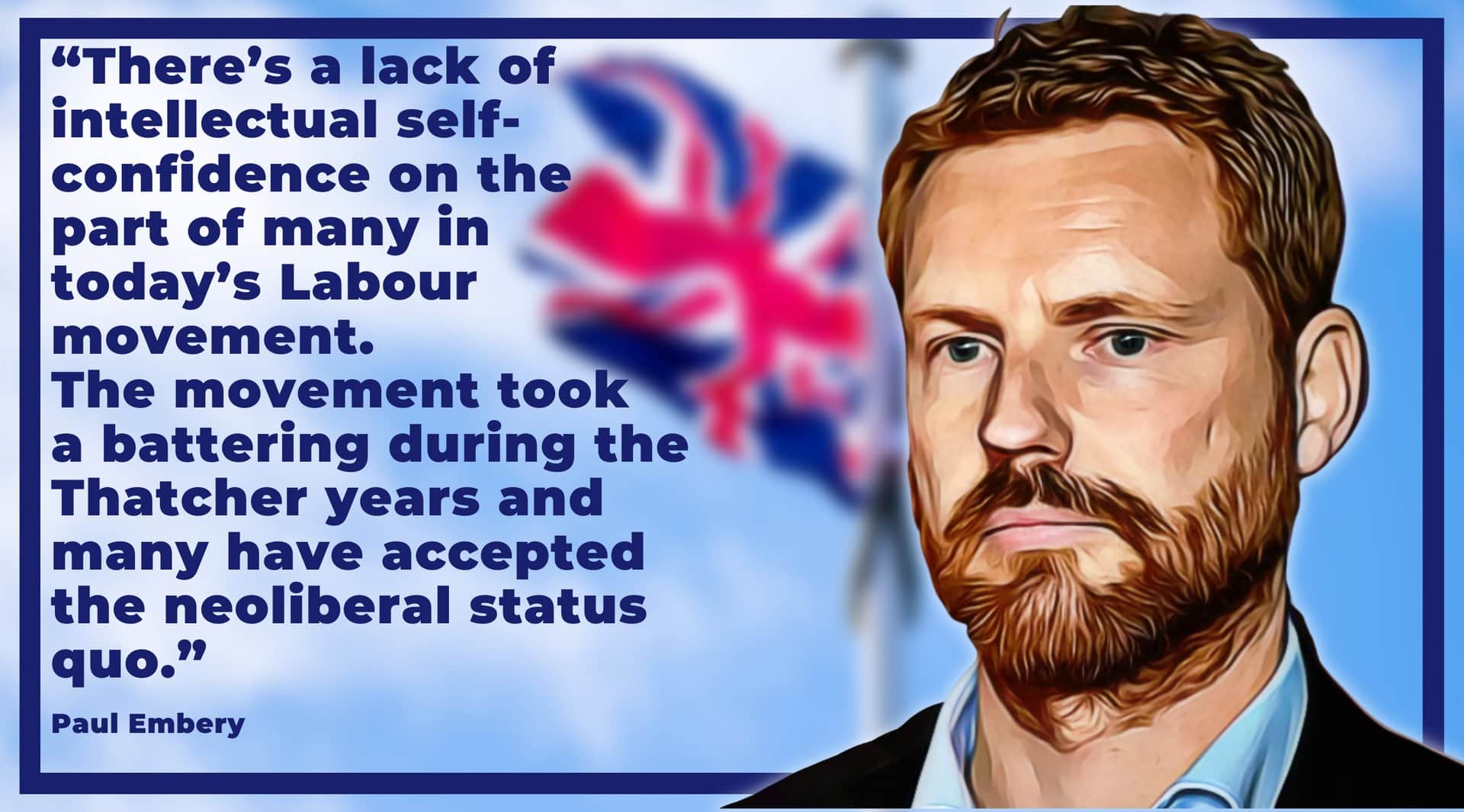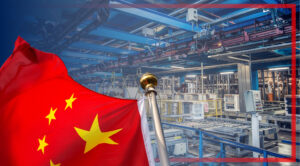At the 2005 Labour Party Conference, Tony Blair delivered a speech in which he sought to explain the thinking behind his embrace of globalisation, hyper-liberalism, and unrestrained market forces. The prime minister, however, demonstrated little understanding of how much pain and confusion rapid socio-economic change was inflicting on the working-class communities he purported to represent. In fact, as far as he was concerned, the matter was not even up for debate.
“I hear people say we have to stop and debate globalisation,” Blair said. “You might as well debate whether autumn should follow summer […] The character of this changing world is indifferent to tradition. Unforgiving of frailty. No respecter of past reputations. It has no custom and practice. It is replete with opportunities, but they only go to those swift to adapt, slow to complain, open, willing, and able to change.”
Paul Embery, a writer, former firefighter, trade union activist, and Labour Party member, recalled that “the speech was revelatory.”
“I always thought it was almost a Thatcherite speech,” Embery told Disruption Banking, “Firstly by saying that there’s no alternative. But the speech was also all about the importance of trade and embracing globalisation. What in effect he was saying that, even if this is disruptive, even if you aren’t comfortable with it, even if does destroy the bonds that hold your community and culture together – you’ve just got to accept it.”
“It was just another way of saying: there’s no such thing as society. To hear a Labour leader stand before a Labour conference and prostrate himself before global market forces in that way – it was just really depressing,” Embery said.
.@MrRBourne: A central failure of Western politics is the presumption there is a political answer to all issues https://t.co/vBwsiU2vBl
— The Telegraph (@Telegraph) March 1, 2019
Embery is a member of the socially conservative Blue Labour campaign group and has written extensively about the transformation of the British Labour Party, as embodied in the Blair project. In his 2020 book Despised, Embery outlines how the party has long failed to represent its working-class heartlands – particularly on issues such as immigration – and, at least in some quarters, has come to loathe the very workers it was established to represent. Instead, Embery believes that Labour has become a party of “liberal cosmopolitans” that are more interested in en vogue topics like identity politics and minority rights.
How did it get to this? In Embery’s view, one of the major reasons for the decline in working-class politics is that “there’s a lack of intellectual self-confidence on the part of many in today’s Labour movement. The movement took a battering during the Thatcher years, and many have accepted the neoliberal status quo.”
This explains, Embery thinks, why the modern Labour Party is so “infatuated” with the European Union. They are not confident enough in their own abilities to run the country, so would rather outsource the responsibility to Brussels. They do not believe in their own capacity to control monetary policy so are happy for the Bank of England to be independent and have technocrats do the job for them.
It remains baffling to me that, for many on the Labour right and soft left, Bank of England independence is an article of faith.
— Stats for Lefties 🏳️⚧️ (@LeftieStats) November 3, 2022
The Bank has an enormous amount of economic power, and they are entirely unelected and out of our control. It's absurd. It should be nationalised.
“They think we’re not really capable of legislating, so we’ll rely on some sort of supranational institution to do that,” Embery said. “We’re not really capable of running the economy so we hand that over to the Bank of England and big business. The mindset has completely changed.”
Embery’s point about the Bank of England is particularly interesting. The central bank’s independence is now seen by many as sacrosanct in British politics but is a relatively new phenomenon. After the landslide New Labour victory in 1997, the new Chancellor Gordon Brown suddenly made the bank independent having barely mentioned the issue in the campaign. There was no vote in Parliament and no discussion in the Cabinet. Embery thinks that this has had a devastating impact on working-class communities; in particular, because of the focus on controlling inflation rather than achieving full employment.
Unfashionable opinion: the decision in 1997 to make the Bank of England 'independent' was wrong. It handed control over a central plank of economic policy to bankers – who will always act in the interests of the financial establishment – and weakened democracy and accountability.
— Paul Embery (@PaulEmbery) May 10, 2022
“I certainly don’t say that high inflation is a good thing, I simply say that inflation should be seen as one factor alongside several other factors in the macroeconomic view of the economy, rather than being the prime goal of monetary policy,” Embery told Disruption Banking. The emphasis on inflation and interest rates is a reflection, Embery said, “of the focus on finance, capital, and the City of London, at the expense of the demands of the real economy.”
Embery also believes that the Bank of England and other authorities have sought to prop up the price of financial assets in the interests of the City. This includes the pound sterling, which he thinks is overvalued and therefore weakens the competitiveness of British manufacturers.
But because Britain now runs a massive trade deficit, and no longer has much of a manufacturing industry to speak of, a weakening currency would likely only contribute to higher inflation by making imported goods more expensive. Would devaluing the pound therefore be counterproductive? Embery said that “it’s a chicken and egg situation as one of the reasons we have that trade deficit in the first place is that we have become fundamentally uncompetitive in the international marketplace.”
An overvalued pound made us profoundly uncompetitive and destroyed our manufacturing industry & thousands of jobs. Why would anyone on the Left want to keep it that way? (And no, Femi, a weaker pound does not affect the value of the pound *in your pocket*) https://t.co/KJPwx4MBWL
— Paul Embery (@PaulEmbery) December 6, 2018
“Deindustrialisation and the chronic balance of payments deficit, that people can’t really talk about nowadays, is a huge problem. For a sterling devaluation to be effective, there would need to be a serious industrial strategy. Japan and Germany both manage to sustain competitive manufacturing industries as advanced industrial democracies,” Embery said. “I don’t accept there’s some sort of inherent reason why we shouldn’t do that as well.”
It’s clear that Embery and the Blue Labour movement speak for millions of working-class voters in Britain, who, not unreasonably, believe that the economy is not designed to work for them. They expressed their dissatisfaction with the status quo twice – with the Brexit vote in 2016 and the landslide Johnson election win in 2019 – but haven’t been listened to on either occasion.
The status quo hasn’t changed in any meaningful way. Net immigration is higher than ever before, with recent figures showing over 600,000 moved to Britain in 2022. Working class voters arguing for a change of course are still “despised” and seen, in Embery’s words, as “nativists, bigots, and racists.”
The political establishment seems to think otherwise, but globalisation in its current form is not inevitable. It is within the power of nation states to pursue other ways of arranging political and economic life. “If a particular economic system or particular social norms don’t work in the interests of the majority of people, then we’ve got the ability to stop it and change it,” Embery said.
“These things are manmade. They’re not natural phenomena. If they’re not working, you put them right.”
Author: Harry Clynch














